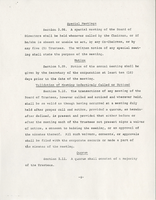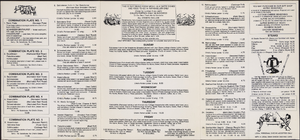Search the Special Collections and Archives Portal
Search Results
Jonathan S. Sparer, FAIA oral history interview
Identifier
Abstract
Oral history interview with Jonathan S. "Jon" Sparer, FAIA conducted by Barbara Tabach on March 04, 2015 for the Southern Nevada Jewish Heritage Project. Sparer discusses his career as an architect of many major Las Vegas, Nevada hotels and casinos. He also talks about designing the Congregation Ner Tamid and The Center for the Lesbian, Gay, Bisexual, and Transgendered (LGBT) community.
Archival Collection
Paul Sarno oral history interview
Identifier
Abstract
Oral history interview with Paul Sarno conducted by David G. Schwartz on July 13, 2007 for the Remembering Jay Sarno Oral History Project. Sarno begins by discussing the Sarno family, his grandparents, their Jewish heritage, and the early life of his uncle, Jay Sarno, and his father. Sarno then describes how his uncle married a lot later than his older siblings and he was the only one who had personal hobbies such as golf. Sarno then chronicles his uncle’s role as a businessman in Las Vegas, Nevada and how he only visited Las Vegas once because his father was a gambling addict. Lastly, Sarno discusses everything he knew about his uncle’s relationship with Allen Dorfman, the Teamster’s Union, and his legal troubles with the Internal Revenue Service.
Archival Collection
Ann Valder Papers
Identifier
Abstract
Ann Valder Papers (1963-1984) include agendas and minutes, programs, invitations, events, and newspaper clippings. The papers are limited to the time Valder spent working for the Review Journal and the Valley Times in Las Vegas, Nevada. The activities covered are her work with Southern Nevada Memorial Hospital and the American Cancer Society.
Archival Collection
Gerald L. Connor oral history interview
Identifier
Abstract
Oral history interview with Gerald Connor conducted by James Bonnell on February 22, 1977 for the Ralph Roske Oral History Project on Early Las Vegas. Connor first discusses moving to Las Vegas, Nevada and serving as a pilot in the United States Air Force. He then discusses his education at the University of Nevada, Las Vegas and his church membership. Topics that Connor discusses during the interview also include changes in the school district and properties located in Downtown Las Vegas and the Las Vegas Strip, his political activity within the Democratic Party, the Helldorado Parades, and the early atomic tests at the Nevada Test Site.
Archival Collection
Homer Rissman Architectural Records
Identifier
Abstract
The collection is comprised of architectural records (1947-2001) of American architect, Homer Rissman and the architectural firm, Rissman and Rissman Associates Ltd, a partnership of Homer Rissman and his brother Marshall. The collection includes 825 items from over 40 major projects and over 110 minor projects. The Rissmans' work represented in the collection focused on Las Vegas, Reno, and Lake Tahoe, Nevada, Los Angeles, Southern California, and Arizona, with Homer's early career design work in Chicago, Illinois. The materials feature hand-drawn architectural drawings, ranging from pencil and ink on tracing paper preliminary sketches to ink on Mylar (TM) construction documents, and a number of artist’s renderings, used for presentations and promotional materials. The drawings also contain work from a number of consultants, engineers, and other architects who collaborated on the development of the various projects. The collection includes architectural drawings for: hotels, casinos, integrated casino resorts, office towers, multi-family residential developments, and custom single-family homes.
Archival Collection

Angela Castro oral history interview: transcript
Date
Archival Collection
Description
Oral history interview with Angela Castro conducted by Stefani Evans, Cecilia Winchell, Kristel Peralta, Vanessa Concepcion, and Ayrton Yamaguchi on November 05, 2020 for the Reflections: The Las Vegas Asian American and Pacific Islander Oral History Project. Castro begins the interview by talking about her early life, childhood, what Guam was like, and the history of her parents and grandparents. She describes the difference in public and private education in Guam and compares it to the United States. She explains the reason why she moved to Las Vegas, Nevada in 1998 and attended the University of Nevada, Las Vegas for public relations. Castro then talks about the differences between older and newer generations, the political atmosphere in Guam, and the differences between the United States and Guam in politics. She also talks about the discrimination she has experienced throughout her life and diversity in the workplace. Lastly, she describes her culture and traditions during holidays, the struggles with an absence of culture within her family, and her personal religious beliefs.
Text

By-laws of the Nathan Adelson Hospice, November 30, 1978
Date
Archival Collection
Description
The by-laws of the Nathan Adelson Hospice establish the purpose and organization of the program, founded in 1978 in Las Vegas.
Text

Interview with Elmer Jesse Sowder, June 23, 2004
Date
Archival Collection
Description
Access note: Audio temporarily sealed
Text

The Oliver dinner menu, Sunday, June 8, 1884
Date
Archival Collection
Description
Text

